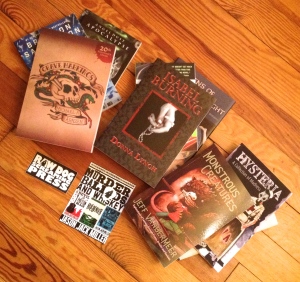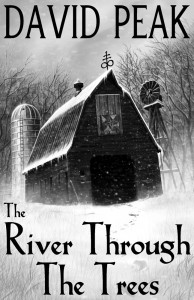I first met Ken MacGregor when his film “The Quirk and the Dead” was under consideration for the 2013 Impy Award. (Watch it on YouTube.) Ken wrote, directed and acted in that short, oddly sweet zombie movie, based on one of his short stories. But I really got know Ken by carpooling to monthly meetings of the Great Lakes Association of Horror Writers. Ken’s relentless drive to keep writing and keep submitting is a source of great personal encouragement. Though he started writing professionally only a couple years ago, Ken’s work has appeared in over 50 publications. His first collection of creepy tales, An Aberrant Mind
, came out last year on Siren’s Call Press. I grin whenever I even *think* of his character Gavin the werewolf. I asked Ken to write a bit about the experience of writing a series of novels with Kerry Lipp, a collaboration that was productive long before the two met face to face.
—–
Long Distance Bromance
Ken MacGregor
Writing has been called one of the loneliest jobs in the world. Sometimes, it really is. But, once in a while, if you find the right person, it can kinda be a party.
I write a lot of horror, among other things, and I’ve been picked up by several anthologies. Some of the same names come up over and over in the tables of contents and you start to get to know people. This one writer, Kerry Lipp (middle initials G.S. for Giant Squid – you’ll have to ask him why) wrote in a style I found very entertaining. His characters were people I could imagine drinking beer with. His sense of humor was remarkably similar to mine. His story-telling resonated with me.
So, around the end of 2012, I shot him a note asking if he wanted to try something together. He asked if I had anything in mind. I did.
I sent Kerry the opening to a short story I had started in which a man wakes up one morning physically dead, but still mentally sharp. He liked it, picked up where I left off and sent it back. We went back and forth like that until we had over 4,000 words and a complete story. It was called “Stiffed” and appears in an anthology called “Life of the Dead.” (This is a shameless plug.)
We had so much fun writing together, I asked if he wanted to do it again.
“Sure,” he said, cheerfully (at least, I assume so. It’s hard to tell tone in a Facebook message). So, I sent him another beginning I had. He liked this one, too, and we did the Ping-Pong thing with the words.
Somehow, though, this one got away from us. The story just kept going. Before we know what was happening, we had written a novel.
How cool is that?
So, from a chance meeting of two writers who liked each other’s work came the first of what will likely prove to be a series of books (we’re already 9,000 words into the sequel and have written a 4,000-word origin story of one of the characters).
Kerry and I have become pretty good friends through this process, which is great. The weird thing, though is that I’ve only ever met him once, at ConText in Columbus, Ohio.
I’ll tell you one thing, however: if we manage to sell this novel, we’ll be seeing a lot more of each other. In the meantime, we’ll keep writing, making each other laugh, leaving our characters in the lurch for the other one to deal with and having a hell of a good time doing it.
We’ll keep our long-distance bromance going as long as it keeps working. Though, to tell you the truth, I have been thinking about seeing other writers…






